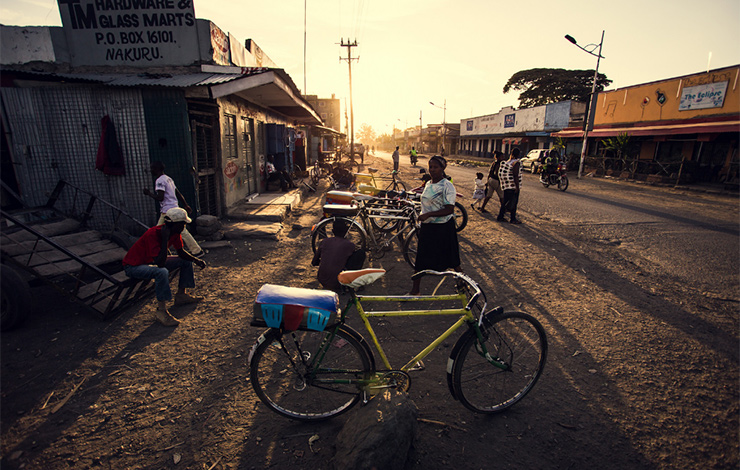COFWE’S Open County Government Program was designed to bring more political and economic resources, as well as decision-making power into the county levels of government in Kenya. This entailed preparing and distributing a public participation protocol manual, holding public dialogues on participatory county budget making and strategic planning processes, and drafting village sustainable development goals (SDGs). COFWE also undertook a series of mapping activities to record village assets, name village streets, and create GIS village maps for Google Maps.
Challenge

The Kenyan Constitution of 2010 created a new governance structure that devolves some of the political and economic resources to the people at the county level. Many of the newly introduced county governments are struggling to survive, with widespread outcries that the central government is attempting to cripple county governments by denying them financial resources. It is envisaged through the changes in the new Constitution that county governments will foster a culture of inclusive development by engaging citizens across the counties in decision making and project implementation. Strong and functioning county governments will also be a deterrent to the corrupt tendencies that continue to bedevil the central government in Kenya. However, this will only happen when strong and visible grassroots development leadership emerges at the county level. The big question is, how can an effective grassroots leadership be nurtured to emerge in the counties of Kenya that will begin to challenge the rampant corruption of the country? The hypothesis of this project is that county Asset Based Community Development (ABCD) approach is an effective way to nurture such grassroots leadership in Kenya. ABCD is a methodology that is promoted by the ABCD Institute and which seeks to map and use the strengths within communities as a means for sustainable development. In this demonstration project the ABCD approach will be applied to one county, Vihiga, in western Kenya. The project has the potential of being duplicated in the remaining 46 counties in the country.
Program Summary
Program Strategic Objectives
- Develop a public participation protocol for the county citizens to engage their leaders on issues of resource and opportunity allocation;
- Map critical community assets that foster justice, peace and democracy;
- Hold public dialogues on questions of justice, democracy and equitable development at the county level; and
- Facilitate residents to take ownership of the county in ways that entrench justice, democracy and sustainable development.
Program Activities
- For Public participation protocol: Preparation and dissemination of a public participation protocol manual, the holding of 3 public dialogues on the manual across Vihiga County, and the preparation of a community participation website.
- For Asset mapping: Village mapping, village street naming, community Geographical Information Systems [GIS] and uploading of village maps onto Google maps.
- For Public dialogues: Engage communities in 6 dialogues on participatory county budget making, village strategic planning and alignment with County Integrated Development Agenda, Millenium Development Goals[MDG], Local Agenda 21, Earth Charter and Kenya Vision 2030.
- Facilitating the community to sustain joint working by forming appropriate governance structures, setting up an office and fundraising for other related projects.
Impact
Project Impacts include:
1. Project impacts on extreme poverty in Vihiga County: By fostering transparency and accountability, this project will ultimately prevent the entrenchment of corruption in the county governance. Reduced corruption will translate into more resources being available for development purposes. Increased development will reduce extreme poverty in Vihiga County, which currently stands at 40%. Reduced extreme poverty will impact many facets of life including fostering gender parity, reducing crime, hunger, hopelessness and illiteracy.
2. Project impacts on justice and democracy in Vihiga County: This project will have significant sustainable outcomes on the entrenchment of just, peace-enhancing and democratic practices in Vihiga County. Sustainable governance structures will be created that will effectively and efficiently mobilise the communities against injustice and exclusion in the years ahead by acting as whistle-blowers or by speaking to authorities, thus expressing the voice of the people. The project will see the local people take ownership of the Local Agenda 21, The Earth Charter, MDGs, Vihiga Integrated County Development Plans, Kenya Vision 2030 and even Africa 2063 Agenda. Committees on these protocols will be established and housed in a central office for effective coordination and networking. Adequate publicity will be given to these committees through the local community radio and press. The work of these committees will outlive this project, thus continuing to sustain the fight against injustice in Kenya. The village maps, street names and strategic plans created are important development assets that many development sectors will depend on for planning and implementing many projects in the future. Uploading these maps onto Google will make Vihiga County a global village whose data can be accessed by all.
3. Direct impacts on participants: At the individual level the project will create effective change-makers. The project will educate the people, it will challenge them and embolden them to question authority using effective tools and techniques. The project will remove fear of those in authority, that makes many people look the other way when those in power are looting public resources.
Partners
Partners are:
- Community Foundation Western Province will be the Lead Partner responsible for the overall project implementation.
- Kenya Old Comrades Association Vihiga [KAFOCA] will be in charge of village mapping and street naming component of the project.
- African Divine Church buildings will be used as venues for meetings and trainings.
- Vihiga NGO Summit will be formed during the project and various committees established under it.
- This project will be made known at the outset to the Governor of the County, NGO Council of Kenya and to all key NGOs operating in the county.

